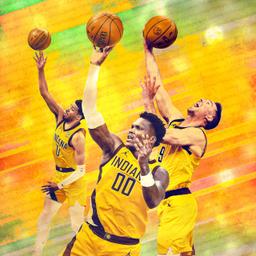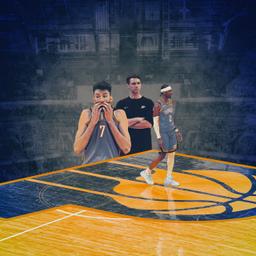Before he got around to calling his own shot, Tyrese Haliburton did what does best—spray around the touches and the glory to everyone else. He shouted out Obi Toppin for his dunks and energy. He praised Bennedict Mathurin for grinding out free throws. He lauded Myles Turner and Pascal Siakam and feisty fan favorite T.J. McConnell, whom Haliburton dubbed, with a chuckle, “The Great White Hope.”
Half of the Indiana rotation earned a mention in Haliburton’s postgame press conference on Wednesday—and deservingly so, after the Pacers stunned the Oklahoma City Thunder for a second time in three NBA Finals games, this one a 116-107 victory in downtown Indianapolis.
“I think in a series like this, what’s so important is the margins,” Haliburton said, a statement that could have referred to McConnell’s five steals, Mathurin’s aggression off the bench (he scored a game-high 27 points), or Ben Sheppard’s stout defensive turns on Shai Gilgeous-Alexander. “You have to win in the margins,” he said.
The supporting guys all played their roles, and Haliburton emphatically reiterated his own—as the Pacers’ undisputed and absolutely vital North Star. His passing and playmaking (11 assists) kept the offense humming and the Thunder defense off-balance. His scoring (22 points) helped secure the victory and ensure Haliburton one last chance to call his own shot—this one, a modest and well-earned clapback against the pundits who spent three days questioning his stardom after a lackluster Game 2 performance.
“I think the commentary is always going to be what it is,” he said. “Most of the time, the talking heads on the major platforms, I couldn’t care less [what they say]. Honestly, like, what do they really know about basketball?”
But that doesn’t mean he didn’t hear it, see it, and feel it in the wake of Sunday’s loss in Oklahoma City, when he barely scored through the first three quarters and finished with almost as many turnovers as assists, all of which triggered a cascade of criticism.
“At a time like this, I’m not really on social media as much. I try to stay off it as much as I can,” Haliburton said, before confessing, “But, you know, you see it, and ESPN might be on in my house, and there it is. You know, it is what it is.”
This is, of course, the 25-year-old’s first time on the Finals stage, which means that a lot of fans and pundits are just learning who he is and what he’s about—and Haliburton, in turn, is just learning what it means to be in this spotlight, to have every shot taken (and those not taken) scrutinized to the nth degree. When Haliburton has one of his magical clutch-shooting nights and the Pacers win, the praise flows. When the Pacers lose and Haliburton doesn’t score much, the backlash is fierce.
Herewith, the first lesson in becoming an NBA star: You’re not allowed to fail or fall short of expectations. Also: Succeeding means scoring—lots of scoring. And because Haliburton—a playmaker first, scorer second—doesn’t fit the conventional models of NBA stardom, he’s an easy target for hot-take artists who specialize in bad-faith critiques and reductive reasoning.
So Haliburton’s redemption in Game 3 comes with some irony: Scoring has never defined him as an NBA star, but it was his scoring that probably made the biggest impression Wednesday night. He hit nine of 17 shots from the field and 4-of-8 from behind the arc, and he was second only to Mathurin in scoring for Indiana. But nothing seemed forced or desperate or like an attempt to prove anything to anyone, and that, too, is what defines Haliburton’s value system. Even on the nights he scores in bunches, he’s not aiming to be a scorer.
Ever the facilitator, Haliburton had almost as many assists (four) as points (five) by the end of the first quarter. His contributions in 36 minutes ranged from rebounding (nine) to sharp, timely help defense against Gilgeous-Alexander. The rest of the game followed a similar blueprint, and Haliburton—who literally limped out of the Oklahoma City arena on Sunday—showed no ill effects from a vague lower-leg injury that had been reported since then.
Haliburton doesn’t need to score to impact the game, but when he does, it generally bodes well for his team. The Pacers are now 20-1 this season when Haliburton has a 20-point and 10-assist game. After Game 2, coach Rick Carlisle emphatically defended Haliburton by noting that the Pacers are more a collaborative ecosystem than a star-driven operation. After Game 3, he praised Haliburton’s balanced approach.
“Terrific,” Carlisle said. “Look, every game, you’re going to have to make adjustments against this defense. There’s just going to be different looks. You’re going to have different high-level defenders on you. You’re going to see some different coverage stuff. It’s going to be constantly changing. So I thought his approach tonight was exactly what it needed to be, a combination of spatial awareness and aggression and a real good feel for aggression to score, along with getting his teammates involved at the right times.”
That balanced attack helped deliver the Pacers their first home victory in the Finals since June 16, 2000, and their first lead in the Finals ever. They’ve gone from being overwhelming underdogs to being in control. They’ve evolved from a team renowned for its potent offense to a team winning with defense, as they showed in holding the Thunder to 6-of-17 shooting in the fourth quarter—and two field goals in the final seven minutes—on Wednesday night.
“We’ve put an incredible amount of work into becoming better defensively,” Carlisle said. “We’re still not great. But we’re way better than we were. It’s taken tons of work. It’s taken constant relationship building. It’s a difficult system. And it just requires a lot of sacrifice. But when you execute it the right way, you know, whether it’s two years ago in some game that doesn’t seem very meaningful in mid-January or in Game 3 of the Finals, these guys see where important things are important and hard things are hard. That’s a phrase I’ve used many times: Hard things are hard.”
Then again, doing the hard things is sort of what defines these Pacers. Here they are, the first team seeded fourth or lower to take a 2-1 lead in the Finals since the Houston Rockets in 1995. Here they are, two wins from the first NBA championship in franchise history, even though they’ve held a lead for just 10.7 percent of game time—less than 21 minutes total—through three games.
And here’s Haliburton, an eager passer and sometimes reluctant scorer, leading the way with a damn near perfect blend of the two—defying pundits while simultaneously scoffing at their simpleminded criticism.
“I’m never going to be super great and shoot so many shots every game consistently,” Haliburton said. “There’s going to be games where I don’t, and I’ve got to be able to find the right balance between the two. But, I mean, I think experience is the best way I can learn from it.”
Less than two months ago, he was named the NBA’s most overrated player in an anonymous player poll. Now he’s on the cusp of something special. It’s been a whirlwind spring, but Haliburton is doing his best to stay focused and shut out the professional shouters on TV.
“The commentary is what it is at this point,” Haliburton said. “It doesn’t matter. We’re here in the NBA Finals, two wins away from an NBA championship. Just got to stay with it, put my head down, keep working. And as a group, we’ve just got to keep learning from our mistakes, see where we can get better, and take our time.”




